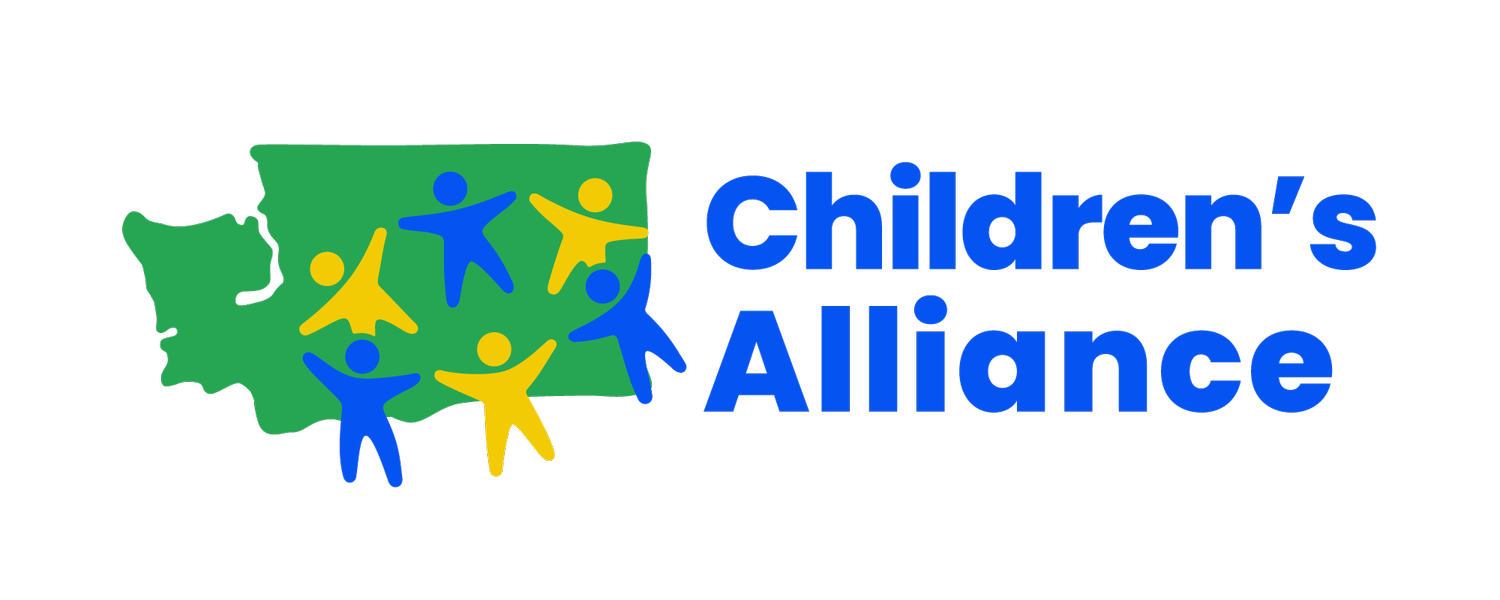WASHINGTON’S BUDGET DEFICIT THROUGH A RACE EQUITY LENS
Our state faces an estimated $15 billion deficit over the next four years, and in response, our governor and legislators are proposing cuts to essential public programs to close the gap. But without a race equity lens, budget decisions risk deepening existing disparities.
Children’s Alliance’s work is grounded in the fundamental belief that for every child in our state to thrive, we must pursue policy solutions that address the needs of children who are furthest from opportunity. Racism and inequity are embedded in the institutions, systems, and policies that affect children’s lives. To eliminate disparities that are rooted in racism, we must design and advocate for policies that are intentionally anti-racist.
As our state grapples with solutions to the budget crisis, we must examine how our state’s tax system exacerbates racial inequities. Without equity-centered reforms, budget shortfalls will disproportionately harm Washingtonians who are Black, Indigenous, and People of Color (BIPOC). As advocates for children, we must ask: How can Washington move toward a fair system that protects all children?
Washington’s regressive tax code: Who pays the price?
Washington has the second most regressive tax code in the country due to its heavy reliance on sales and property taxes. These taxes hit low- and middle-income families hardest as they have to spend a higher percentage of what they earn on basic needs, like food and housing. The Institute on Taxation and Economic Policy reports that Washingtonians making minimum wage pay 13.8% of their income in taxes. The top 1%, on the other hand, pay just 4.1% of their income for the same taxes.
The American Community Survey reported that in 2023, 198,000 children in our state were in poverty, meaning 12% of children lived in families with incomes below the federal poverty level. Importantly, Black children made up only 4% of the population in Washington but 24% of the children in poverty. American Indian and Alaska Native children made up 21% of the children in poverty but only 1% of the population.
This 2023 data shows that our existing tax structure disproportionately impacts children of color, who are overrepresented among households with low incomes. That means our state’s tax code is not just unfair, it actively reinforces racial economic inequality.
As lawmakers publish proposals to solve the budget shortfall this session, the focus is primarily on budget savings (i.e., cuts and delays to programming). Governor Ferguson presented $4 billion in new reductions at the end of February and said he supports $3 billion in savings that former Governor Inslee proposed at the end of 2024. His savings proposal includes recommendations for furloughing state workers, decreasing funding for food banks, pausing expansions for our public preschool program (the Early Childhood Education and Assistance Program or ECEAP) and state-administered child care subsidy (Working Connections Child Care or WCCC), and eliminating Early ECEAP.
Balancing the budget by cutting public investments will negatively impact families across our state who rely on these programs to get by, and it will disproportionately harm BIPOC families and children. According to the Department of Children, Youth and Families, Black children are overrepresented in both ECEAP and WCCC enrollment. And according to a food survey of Washington residents, Black and Hispanic households are twice as likely to experience food insecurity compared to White households.
Because of Washington’s regressive tax system, essential services for communities with low incomes are reliant on taxes from those same communities, pressuring families to make impossible choices between housing, employment, food, and child care.
A more equitable path forward
Cuts and delays to programs and services, no matter how carefully deliberated, will disproportionately harm families with low incomes and BIPOC communities. This approach is also only half the equation to solving Washington’s budget crisis. We urge Washington lawmakers to consider progressive revenue options to minimize cuts to essential programs and create a fairer system that requires the ultra-wealthy to pay what they owe.
Many Democratic legislators have been strong proponents for progressive revenue, and lawmakers on both sides of the aisle are coming to terms with the reality that a more progressive tax system is necessary. Representative Timm Ormsby, chair of the House Appropriations Committee, recently released a statement regarding our state’s latest revenue forecast.
“Given the volatility of the last few months on the national and international stage and our own challenges here in Washington state through increased inflation, higher caseloads, and uneven revenue growth, this is what we expected.
With revenue growth slower than it has been in about a decade, and the continued impacts of inflation being felt across the budget, we know what we need to do. House Democrats are taking a balanced approach to reducing the budget where we can and addressing our regressive tax structure to ask the wealthiest in our state to help us keep people alive.
Let’s be crystal clear: Our focus is on maintaining food, shelter, and health for Washington residents. When we ask for revenue, it’s because it’s necessary to keep people alive.” – Representative Timm Ormsby
Both the House and the Senate have also released their respective budget bills for the upcoming biennium. Progressive revenue proposals within the Senate bill include a tax on ultra-high-value financial intangible portfolios, reforms to property tax, a high-earner payroll tax on employers, business and operations (B&O) taxes on businesses, closing antiquated tax loopholes, and a reduction in sales tax. The House bill also includes a tax on ultra-high-value financial intangibles.
As Children’s Alliance advocates for our state’s children, we remain steadfast in the belief that policies that are “race-neutral” perpetuate systemic racism and inequities by upholding a status quo deeply rooted in wealth and Whiteness.
We acknowledge the hard choices ahead, and as advocates and lawmakers determine what to prioritize in the days and weeks ahead, we encourage decisions that center race equity by considering who it helps, who it may harm, and who was at the table when decisions were being made.

